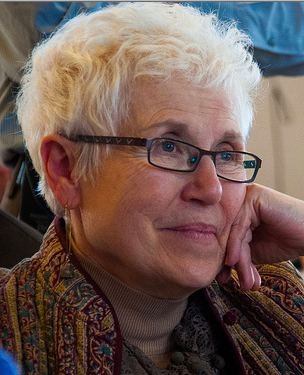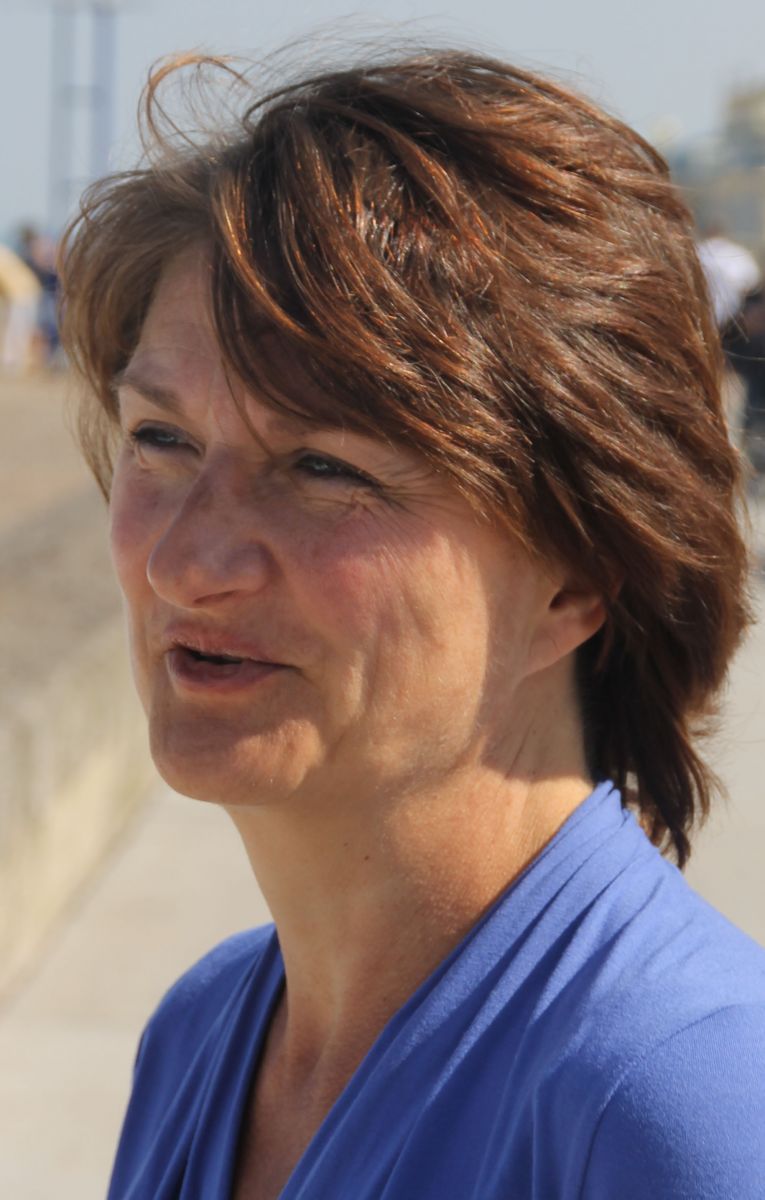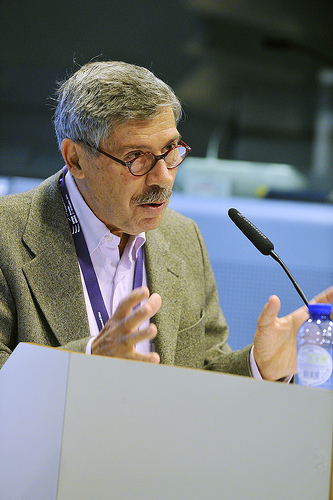You are here
Keynote Speakers
The ESRS 2015 committee are pleased to announce their keynote speakers. They are:
Professor Harriet Friedmann, University of Toronto, Sociologia Ruralis Lecture
Title: Precipice and Possibility: A Food Regime Approach to Emergent Futures of Growing and Eating
 Biography: Harriet Friedmann, food systems analyst, author, and speaker, is Professor Emerita of Sociology at the University of Toronto, based at the Munk School of Global Studies, and a Visiting Professor of Development Studies at the Institute of Social Studies, The Hague. She participates in international research and policy on food and agriculture, most recently with The Federal Rural University of Rio de Janeiro (2014) and the Centre International en Recherche Agronomique pour le Developpement in Montpellier (2012-13). She participated in the International Assessment of Agricultural Knowledge, Science, and Technology for Development (IAASTD) and serves on the editorial boards of several international journals related to food and agriculture. Friedmann is a member and former chair of the Toronto Food Policy Council, a pioneer in linking civil society and municipal governments in comprehensive food strategy, and a member of the board of USC-Canada, devoted to participatory seed networks. She developed the food regimes approach (with Philip McMichael), and is currently preparing a book on Political Ecology of Food (with Tony Weis). She was awarded the 2011 Lifetime Achievement award by the Canadian Association of Food Studies.
Biography: Harriet Friedmann, food systems analyst, author, and speaker, is Professor Emerita of Sociology at the University of Toronto, based at the Munk School of Global Studies, and a Visiting Professor of Development Studies at the Institute of Social Studies, The Hague. She participates in international research and policy on food and agriculture, most recently with The Federal Rural University of Rio de Janeiro (2014) and the Centre International en Recherche Agronomique pour le Developpement in Montpellier (2012-13). She participated in the International Assessment of Agricultural Knowledge, Science, and Technology for Development (IAASTD) and serves on the editorial boards of several international journals related to food and agriculture. Friedmann is a member and former chair of the Toronto Food Policy Council, a pioneer in linking civil society and municipal governments in comprehensive food strategy, and a member of the board of USC-Canada, devoted to participatory seed networks. She developed the food regimes approach (with Philip McMichael), and is currently preparing a book on Political Ecology of Food (with Tony Weis). She was awarded the 2011 Lifetime Achievement award by the Canadian Association of Food Studies.
Abstract: How might a food regime perspective help to interpret present unfolding transitions across scales of land use, cultural and social organization, and political and economic institutions? Food regimes can sensitize our interpretations of present transitions - which may include both very small and very large scale changes- by understanding those of the past, particularly the foregone possibilities rendered invisible by linear histories of the constellations that actually emerged. I explore cycles at multiple spatial and temporary scales, including the possibility that human relations to the earth (our species' "mode of foodgetting") is in an extended 500 year transition towards either a much degraded future (anticipated by apocalyptic cultural productions) or a more diverse, abundant future, whose emergent elements we can train our eyes to see.
Professor Terry Marsden, Cardiff University
Title: Natural Powers: Exploring the rural eco-economy 'beyond neo-liberalism'
 Biography: Terry Marsden currently holds the established chair of Environmental Policy and Planning in the School of Planning and Geography at Cardiff University. He is Director of the Sustainable Places Research Institute at Cardiff and Dean of the University Graduate College. His scholarly work emphasises critical engagement with environmental and rural policy-making, and related research advisory boards and evaluation committees. He has published over 150 international journal articles, book chapters or books in the fields of rural geography, rural sociology, environmental sociology, geography and planning. This includes 20 research monographs and edited collections, including ‘Sustainable food systems: building a new paradigm’ (2014), ‘The Differentiated Countryside’ (2012) and The New regulation and governance of food: beyond the food crisis? (2010).
Biography: Terry Marsden currently holds the established chair of Environmental Policy and Planning in the School of Planning and Geography at Cardiff University. He is Director of the Sustainable Places Research Institute at Cardiff and Dean of the University Graduate College. His scholarly work emphasises critical engagement with environmental and rural policy-making, and related research advisory boards and evaluation committees. He has published over 150 international journal articles, book chapters or books in the fields of rural geography, rural sociology, environmental sociology, geography and planning. This includes 20 research monographs and edited collections, including ‘Sustainable food systems: building a new paradigm’ (2014), ‘The Differentiated Countryside’ (2012) and The New regulation and governance of food: beyond the food crisis? (2010).
Abstract: The current intensification of efforts to develop post-carbon solutions to the global food/energy security problems is developing a highly contested policy/technology/production/consumption arena. The paper examines how current attempts to resolve these new productivist priorities are embedded in combinations of sustainability, security, sovereignty and resource governance concerns.
These conditions have profound implications for the management, regulation and spatial development of rural areas, with new contested framings of the bio-economy and the eco-economy; and further deepening of neo-liberalist regulation in some regions and the emergence of the ‘New Rural Paradigm’ in others. The paper argues that it is important to develop and apply a critical ‘post-normal’ sustainability science approach to developing the place-making properties of the eco-economic model of rural development, as well as examining the implications of the wider and more dominant bio-economic framing. The analysis argues that to achieve synergies between sustainability, security, sovereignty and effective resource governance, a more place-based eco-economic model of development needs to be progressed.
This requires both conceptual and methodological innovation in rural research which rebuilds and redesigns rural development pathways which embrace post-neoliberal framings associated with: (i) the distributed economy, (ii) translocalism, (iii) multi-level reflexive governance, and (iv) re-financialisation through the divestment of carbon-based ‘stranded assets’. These trends could create real impetus behind the new rural development paradigm, creating major opportunities for rural regions as innovative and distributed platforms for the delivery of sustainable resources in an increasingly urbanised world. To capture this opportunity it will be necessary to place rurality at the centre of wider sustainability science and governance debates.
 Biography: Nigel Swain a Senior Lecturer in History at the School of Histories, Languages and Cultures, University of Liverpool. He graduated in Social and Political Sciences at the University of Cambridge in 1973. His PhD, also from Cambridge, examined the social and economic forces underlying Hungary's relatively successful collectivisation of agriculture. In the 1980s he worked outside the academic sector as a computer programmer and systems analyst, but returned to university life after the Berlin Wall was breached. Dr Swain has undertaken seminal research into political developments in East Central Europe and the Balkans, addressing land reform and decollectivisation, social capital, and changes to rural economy and society. He is the author of numerous books and journal articles, including ‘Green Barons, Force-of-Circumstance Entrepreneurs, Impotent Mayors’(2014), ‘Collective farms which work’(1985, re-issued in 2008) and four editions of ‘Eastern Europe since 1945’. He addressed issues relating to neoliberalism and Eastern Europe in his paper ‘A Post-Socialist Capitalism’ (2011) Europe-Asia Studies.
Biography: Nigel Swain a Senior Lecturer in History at the School of Histories, Languages and Cultures, University of Liverpool. He graduated in Social and Political Sciences at the University of Cambridge in 1973. His PhD, also from Cambridge, examined the social and economic forces underlying Hungary's relatively successful collectivisation of agriculture. In the 1980s he worked outside the academic sector as a computer programmer and systems analyst, but returned to university life after the Berlin Wall was breached. Dr Swain has undertaken seminal research into political developments in East Central Europe and the Balkans, addressing land reform and decollectivisation, social capital, and changes to rural economy and society. He is the author of numerous books and journal articles, including ‘Green Barons, Force-of-Circumstance Entrepreneurs, Impotent Mayors’(2014), ‘Collective farms which work’(1985, re-issued in 2008) and four editions of ‘Eastern Europe since 1945’. He addressed issues relating to neoliberalism and Eastern Europe in his paper ‘A Post-Socialist Capitalism’ (2011) Europe-Asia Studies.
Abstract: My contribution endeavours to give an overview of the ways in which neo-liberal priorities, the specificities of post-socialist capitalism, and the contradictory policy directions of the EU’s Common Agricultural Policy have impacted on livelihoods and live chances in the rural communities of Eastern Europe. The picture is ambiguous. The CAP has increased the profitability of large-scale, post-socialist farms; it has made profitable family farming on a ‘modest’ scale, so attracting new entrants; and it helps sustain some eco-farming. But the situation for the majority for whom agriculture is not a major source of income is bleaker. Regional differentiation has increased more dramatically than elsewhere, leaving many villages with aging populations dependent on social benefits complemented by subsistence farming. LEADER-type policies struggle to find the active citizens they are directed at. Rural local authorities receive ever-reduced finance, yet are expected to implement national policies. The rural landless, many of them Roma, are obliged to participate in workfare schemes with no perspectives for future employment.
 Biography: Bettina Bock works currently as Associate Professor Rural Sociology at the Department of Social Science of Wageningen University, The Netherlands. She holds a PhD in rural sociology based on a study of gender and rural development policy and practice defended in 2002. She teaches in social theory, sustainable development, food policy and health and supervises PhD’s in the field of rural development, gender, sustainable food and animal welfare policy. She is editor in chief of Sociologia Ruralis and has been a board member of the European and International Society for Rural Sociology (ESRS & IRSA). Her research projects include rural development and social innovation, rural gender relations, farm animal welfare as well as sustainable food consumption and production. Recently she has coordinated the EU funded project FOODLINKS, which aims to develop new modalities of linking research to policy-making in the field of sustainable food consumption and production. She has also been a member of the coordinating team of EUWelNet, an interdisciplinary (EU funded) study of implementation of farm animal welfare legislation across Europe. She has published on social equality, rural gender issues, rural development governance as well as animal welfare policies in a number of international journals.
Biography: Bettina Bock works currently as Associate Professor Rural Sociology at the Department of Social Science of Wageningen University, The Netherlands. She holds a PhD in rural sociology based on a study of gender and rural development policy and practice defended in 2002. She teaches in social theory, sustainable development, food policy and health and supervises PhD’s in the field of rural development, gender, sustainable food and animal welfare policy. She is editor in chief of Sociologia Ruralis and has been a board member of the European and International Society for Rural Sociology (ESRS & IRSA). Her research projects include rural development and social innovation, rural gender relations, farm animal welfare as well as sustainable food consumption and production. Recently she has coordinated the EU funded project FOODLINKS, which aims to develop new modalities of linking research to policy-making in the field of sustainable food consumption and production. She has also been a member of the coordinating team of EUWelNet, an interdisciplinary (EU funded) study of implementation of farm animal welfare legislation across Europe. She has published on social equality, rural gender issues, rural development governance as well as animal welfare policies in a number of international journals.
Abstract: Rural development is a long standing issue which has been supported through European policy in various ways. This support has been effective in so far as many rural areas are prospering. This is, however, not true for all rural areas, with differences between rural areas increasing across and within countries. This process is reinforced by the financial crisis and austerity measures, and adds to a general process of societal segmentation taking place in Europe – between countries, regions and social groups. Recently social innovation has been introduced as the new ‘deus ex machina’ realising development and growth, while at the same time warranting social inclusion and counteracting social inequality. It is especially in urban contexts that social innovation is seen as a promising novel approach, but is has also been adopted in rural development programmes. A central question of this talk is if social innovation may also be an effective weapon to fight rural marginalisation, why that could be the case and what conditions then must be met.
Professor Costis Hadjimichalis, Harokopio University
Title: Neoliberalism and the omission of socio-spatial justice in regional development theories and policies
 Biography: Costis Hadjimichalis is professor Emeritus of Economic Geography and Regional Development at the Department of Geography, Harokopio University Athens. He previously held a post at the Department of Urban and Regional Planning, Aristotle University of Thessaloniki, and has been visiting professor at Roskilde University (Denmark), UCLA and Berkeley (USA), Oslo (Norway), NIRSA (Ireland), Macquarie University (Australia) and Universitá deggli Studi di Padova (Italy). His current research and publications concern uneven geographical development and socio-spatial justice in the Eurozone, the social and spatial effects of the economic crisis in Southern Europe, the role of small firms in local development and a radical interpretation of landscapes as part of everyday life. He is section editor for Regional Development in the International Encyclopaedia of Human Geography (Elsevier), managing editor of Geographies (a Greek journal) and member of the editorial board in several other international journals. His recent books (all in Greek) include: Contemporary Greek Landscapes (editor, 2011), Space in Radical Left Thought (co-authored with D. Vaiou, 2012) and Debt Crisis and Land Dispossession (2014).
Biography: Costis Hadjimichalis is professor Emeritus of Economic Geography and Regional Development at the Department of Geography, Harokopio University Athens. He previously held a post at the Department of Urban and Regional Planning, Aristotle University of Thessaloniki, and has been visiting professor at Roskilde University (Denmark), UCLA and Berkeley (USA), Oslo (Norway), NIRSA (Ireland), Macquarie University (Australia) and Universitá deggli Studi di Padova (Italy). His current research and publications concern uneven geographical development and socio-spatial justice in the Eurozone, the social and spatial effects of the economic crisis in Southern Europe, the role of small firms in local development and a radical interpretation of landscapes as part of everyday life. He is section editor for Regional Development in the International Encyclopaedia of Human Geography (Elsevier), managing editor of Geographies (a Greek journal) and member of the editorial board in several other international journals. His recent books (all in Greek) include: Contemporary Greek Landscapes (editor, 2011), Space in Radical Left Thought (co-authored with D. Vaiou, 2012) and Debt Crisis and Land Dispossession (2014).
Abstract: In the paper I intend to discuss certain issues of regional development theory and policy in combination with the long-forgotten principles and values of socio-spatial justice in the context of the current economic and social crisis in the Eurozone and in Southern Europe in particular. The dominant explanations of the crisis are mainly macro-economic and financial but in this paper I will argue for its geographical components/foundations. Under neoliberal hegemony, local/regional development theories and policies in the EU and in member states ignored geographical unevenness particularly in rural areas and paid scant, if any attention, to its effects and hence to socio-spatial justice. Neoliberal approaches helped to mystify the interplay between internal/endogenous and external/exogenous factors responsible for geographical unevenness by focusing only to internal factors. In this respect the crisis in regions of SE since 2009 was attributed to “their own problems” only, reproducing the old dogma “blame the victim”.


.jpg)




